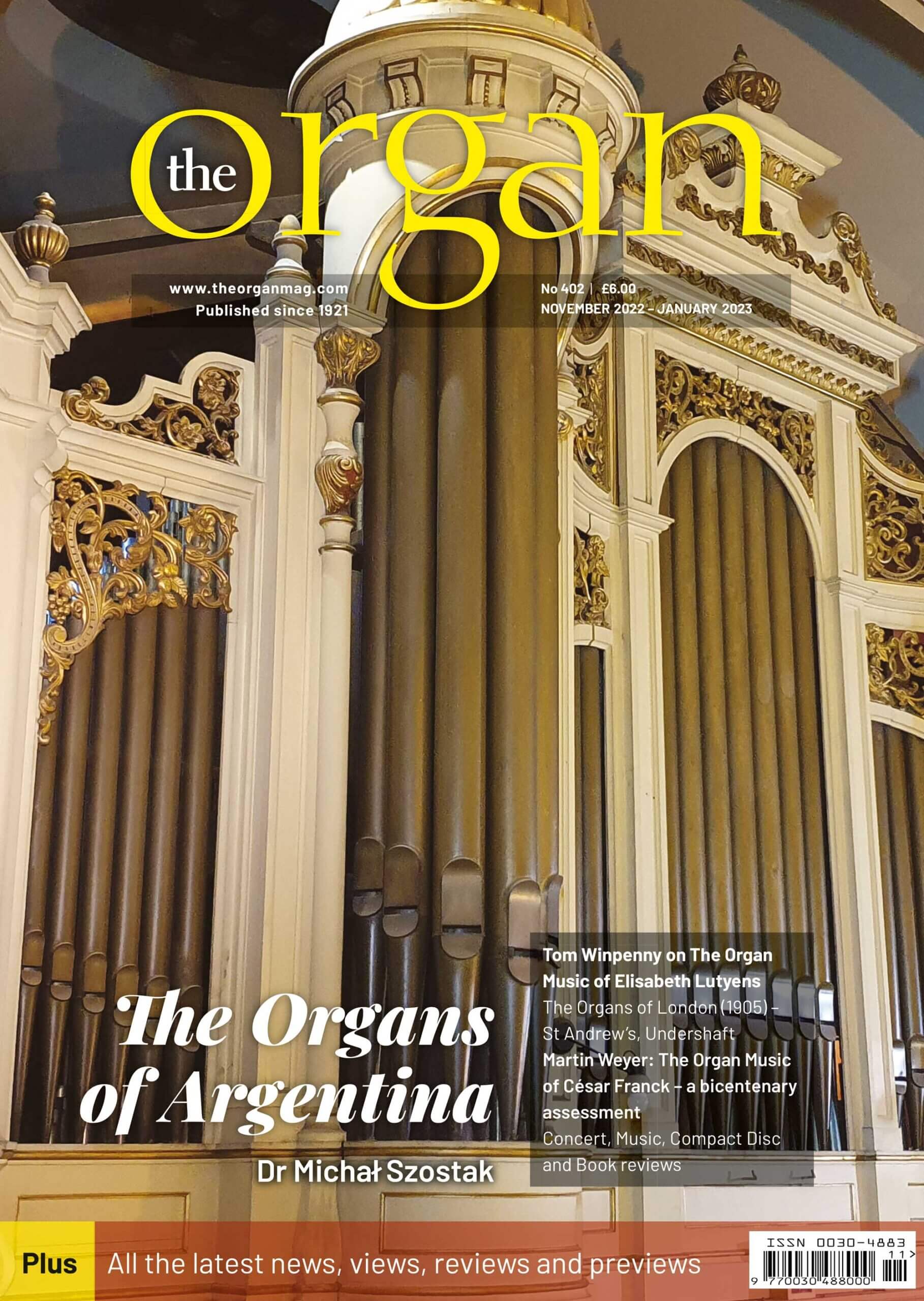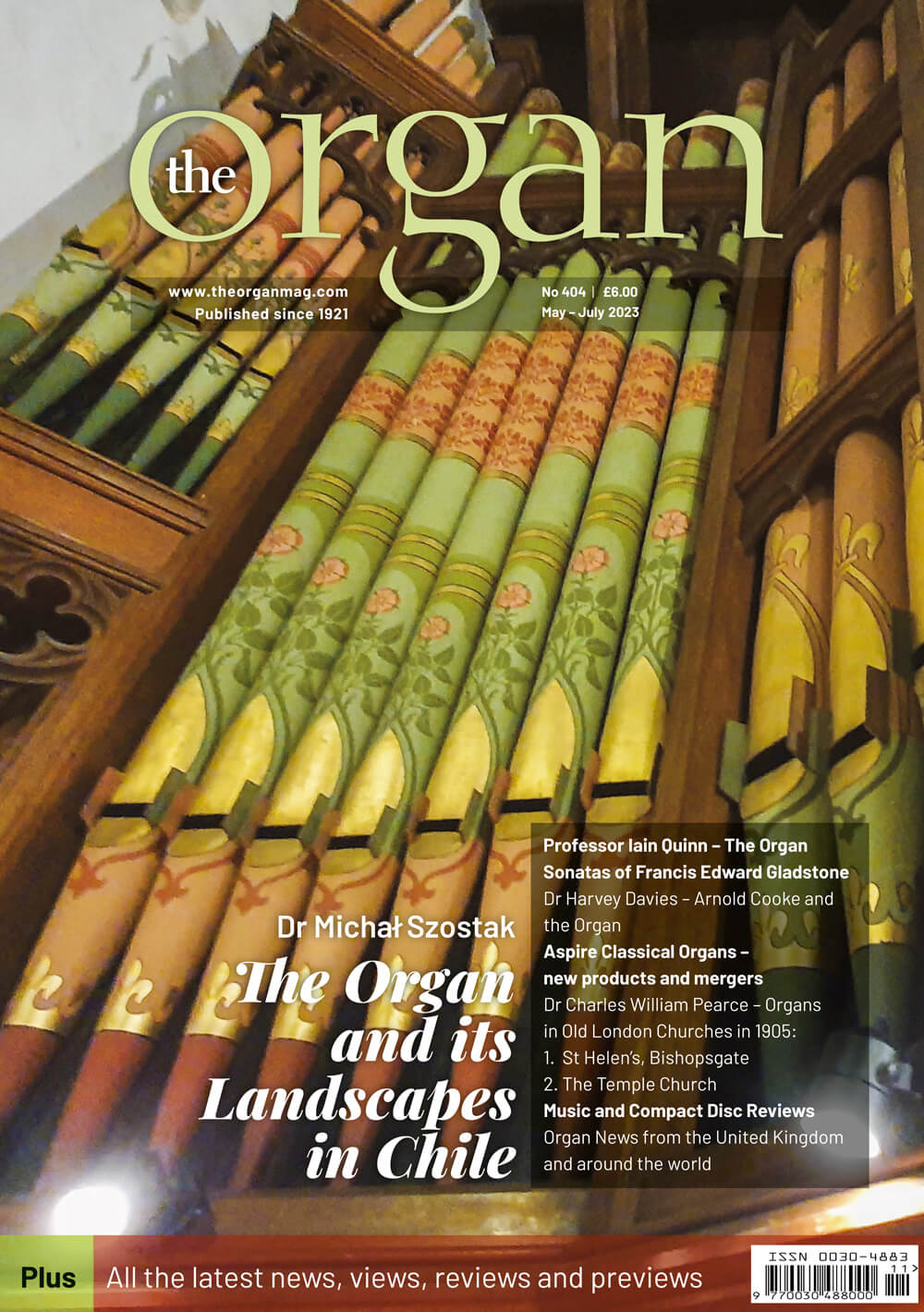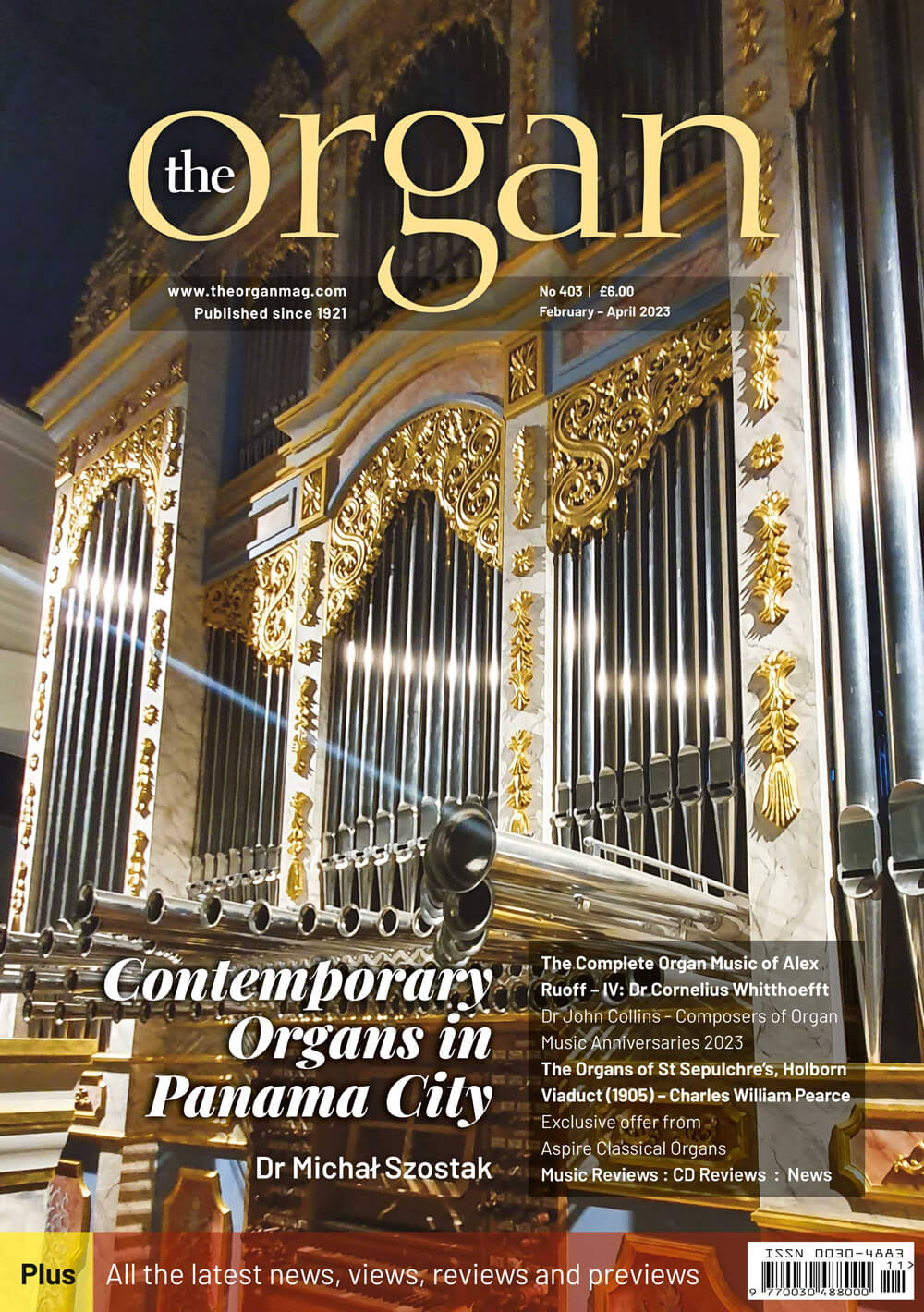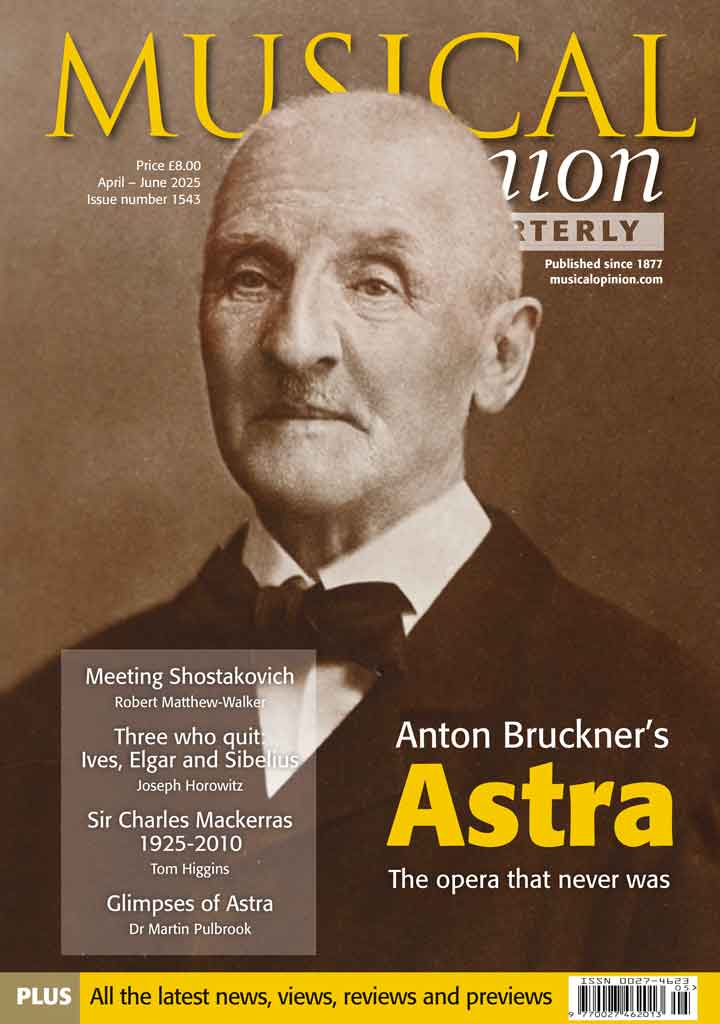

Current Issue
Reviews
Munich Bavarian State Opera – Donizetti: The Daughter of the Regiment
The last new production of Donizetti‘s opéra-comique La Fille du régiment at the Bavarian State Opera was in German (as Die Regimentstochter) and dates from September of 1935. The nearly 90-year gap is at least partly due to a general rejection in Germany of anything...
Handel: Jephtha: Royal Opera House, London
‘That whatsoever cometh forth of the doors of my house to meet me, when I return in peace from the children of Ammon, shall surely be the Lord’s, and I will offer it up for a burnt offering.’ Such is the vow of Jephtha, the eponymous hero of Handel’s final Oratorio....
Guest Editorial
Britten: Death in Venice
Marx in London!
Scottish Opera Glasgow – Jonathan Dove: Marx in London! This opera was first heard at the Stadttheater Bonn in 2018 in a staging by Jürgen R. Weber in commemoration of Marx’s 200th anniversary. Weber’s production is a satirical account of one day from Marx’s life in...
Berlin Staatsoper unter den Linden – Wagner: Tannhäuser
What happens when an opera house asks a ballet dancer and choreographer with her own dance company to produce an opera? There is a lot of ballet where normally there is not, and there is hardly any Personenregie. Tannhäuser has a place for ballet, normally given to...
The Ring Cycle in Sofia, Bulgaria
Parsifal Parsifal was the sixth Wagner opera to be produced at the Sofia Opera by Plamen Kartaloff in his mission to develop a Wagnerian tradition in Bulgaria. First staged in 2015, the preparation for the opera was assisted by Richard Trimborn. Kartaloff believes...
ENO – Rhinegold
Wotan may be a god, but he never strikes me as the brightest button in the box. His decision to give away Freia as payment to the giants for Valhalla, his castle in the sky, has clearly not been thought through. So too is the Arts Council’s decision to uproot English...
Opera North: Rigoletto
If you stroll around the ever-expanding Salford Quays complex these days, you will see a very different Media City to the one when the Lowry Theatre first opened more than 20 years ago. BBC and ITV studios, hotels, bars, restaurants, apartment blocks, trams and an...
New Recital Series at Leighton House from Lisa Peacock Concert Management
Lisa Peacock Concert Management Ltd announces the greatly anticipated appearance in London of Juan Pérez Floristán, Gold Medallist of the Arthur Rubinstein International Piano Master Competition 2021 in music by Chopin, Liszt, Wagner/Liszt and Beethoven on Saturday...
Explore By Topic
Bari – Teatro Petruzzelli: La Traviata
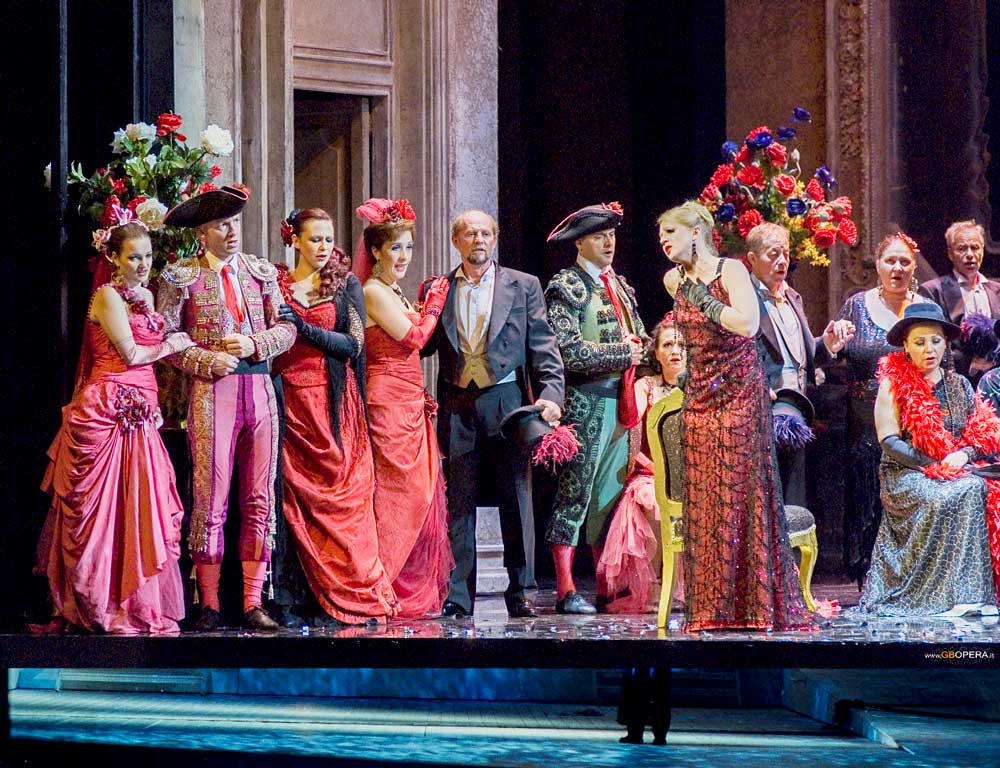
Eduardo Benarroch
Is it possible the there is one Musical Opinion reader who has never seen La Traviata? And maybe is it also possible this reader has not formed an opinion about the central character before even seeing the opera? And maybe this reader also has a great degree of sympathy for Violetta, feeling as one does, that she has been given a bad hand in life, that she has been reduced to sell herself to the best bidder. I know what Gurnemanz would say, Mmmmm….. So prepare yourselves for another kind of Violetta. One that feels perfectly at home in her skin, who enjoys giving parties full of lascivious couples, who drinks champagne non-stop, who knows how to choose her lovers and feels this is her world. For this Violetta “Sempre Libera” means, for once, exactly that: she is free and has no commitments, nothing to tie her down. So it is not strange that when she hears Alfredo singing outside her window and exclaims “Ah, forse lui…” her attitude is one of impatience, “who is this young man who intrudes in my world and comes to disturb my peace?” In the second act, we see a different type of Violetta, where she is no longer in command. When Giorgio Germont enters and demands she releases his son from her clutches she responds innocently, unskilled: she does not know what to do because this is definitely not her world and nothing has prepared her for this. By the time the last act comes, she is a shadow of herself, but she does not enjoy self pity and gives Alfredo advice…. before this poor young man is able to realize what kind of woman he let go earlier, the end comes. We have seen many Violettas who give the impression that they are doomed from the beginning, who sing Sempre Libera more like a musical exercise rather than an expression of freedom. Nino Machaidze did exactly the opposite. Hardly have I seen a Violetta enjoying her party with such gusto, so sexy, so much in command. Her first act register was perfect, no problem with the coloratura nor with the lightness in the voice; in the second, she let her lyrical tessitura bloom, the contrast between the two Violettas could not have been greater. Hers was a fine Violetta indeed and all of her own, as acting-wise she was the only one to project the character’s inner thoughts.
Celso Albelo’s Alfredo followed the line of well schooled Spanish singers. His voice reflected this, direct, clean, safe, no vices, he sang the second act cabaletta oh mio remorso with full tone ending with a well placed top C (which is not in the score, but never mind). It would not be the first time that a Giorgio Germont takes the laurels and the biggest applause in the evening. It happened to me in Buenos Aires many years ago when Joan Sutherland made her debut. Her Germont pére was Piero Cappuccilli, also making his debut. On December 18th, it was Vladimir Stoyanov’s turn to provide the best singing of the evening, which was already high. Stoyanov had to contend with a very poor regie by Hugo de Ana, who did not allow him to project a credible role on stage. But Stoyanov more than compensated with his singing: smooth, characterful, very well phrased – a very fine singer indeed. There were also good contributions from Daniella Innamorati as an expert and dominant Flora, Margarita Pugliese as a decisive Annina, Saverio Fiore as a fresh-voiced Gastone and Dongho Kim as Dr Grenvil, a promising voice. But all this would not have sufficed to elevate this performance from a reasonably good level, to a very fine level, and this was achieved thanks to Giacomo Sagripanti – a conductor who took the score by the horns and delivered a fresh, mostly fast, reading, full of chiaroscuri, deliberate changes of tempi making this a memorable evening of pure Italianate sound. Sagripanti made the score sound alive, full of energy and when coming to special moments (such as Amami Alfredo!) he used the brass to such an effect to frame this short episode that one thought I have never heard it like this before. Make no mistake, the Petruzzelli has a very good orchestra, which will be well tested later on next year with Salome, Tannhäuser and even The Rape of Lucretia. I have no hesitation in recommending a visit to Bari and the Petruzzelli.

